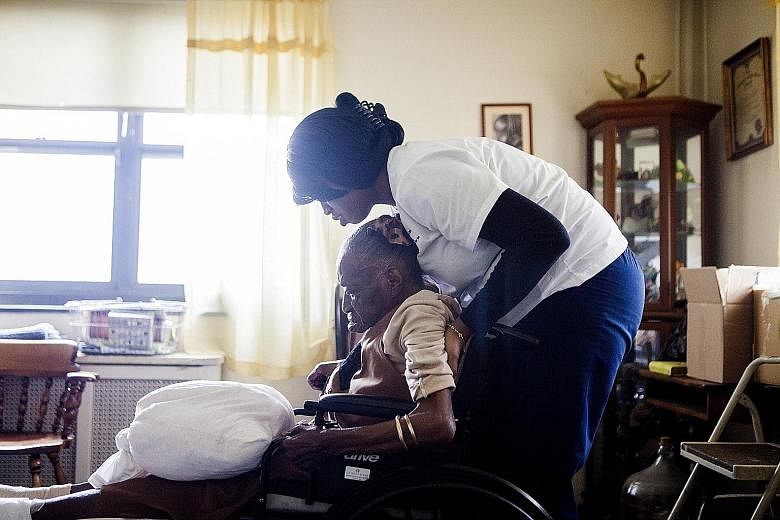NEW YORK • Three diseases, leading killers of Americans, often involve long periods of decline before death. Two of them - heart disease and cancer - usually require expensive drugs, operations and hospitalisations. The third, dementia, has no effective treatments to slow its course.
So when a group of United States researchers asked which of these diseases involved the greatest healthcare costs in the last five years of life, the answer they found might seem surprising. The most expensive, by far, was dementia.
The study looked at patients on the US' federally administered social insurance system Medicare. The average total cost of care for a person with dementia during those five years was US$287,038 (S$399,000).
For a patient who died of heart disease, it was US$175,136. For a cancer patient, it was US$173,383. Medicare paid almost the same amount for patients with each of those diseases - close to US$100,000 - but dementia patients had many more expenses that were not covered.
On average, the out-of-pocket cost for a patient with dementia was more than 80 per cent higher than the cost for someone with heart disease or cancer.
The reason is that dementia patients need caregivers to watch them, help with basic activities like eating, dressing and bathing, and provide constant supervision to make sure they do not wander off or harm themselves. None of those costs was covered by Medicare.
For many families, caring for a dementia patient often "consumed almost their entire household wealth", said Dr Amy Kelley, a geriatrician at Icahn School of Medicine at Mount Sinai in New York and the lead author of the paper published on Monday in the Annals of Internal Medicine.
"It's stunning that people who start out with the least end up with even less. It's scary," said Dr Kenneth Covinsky, a geriatrician at the University of California in San Francisco. "And they haven't even counted some of the costs, like the daughter who gave up time from work and is losing part of her retirement and her children's college fund."
Everything gets complicated when a person has dementia, noted Dr Christine Cassel, a geriatrician and CEO of the National Quality Forum. She described a familiar situation: If a dementia patient in a nursing home gets a fever, he lands in hospital. There, such patients tend to have complications - they get delirious and confused, fall out of bed and break a bone, or choke on their food. Medical costs soar.
The reason for the big disparities in out-of-pocket costs between the three diseases, Dr Kelley said, is that Medicare covers discrete medical services like office visits and acute care such as hospitalisation and surgery. Expenses for cancer and heart patients tend to be of that sort. They often do not need full-time home or nursing home care until the very end of their life, if at all.
Dementia patients, in contrast, need constant care for years. They may not be sick enough for a nursing home, but cannot be left alone. When they need a nursing home, that cost is not covered by health insurance. More than half of patients with dementia use savings to pay until nothing is left. Then Medicaid, the federal-state programme for low-income people, takes over.
"It's a terribly expensive disease," said Ms Virginia Benson, whose husband, George, 91, has Alzheimer's. Yet Mr Benson has almost no medical expenses. "It's exclusively care costs," his wife said.
NEW YORK TIMES

